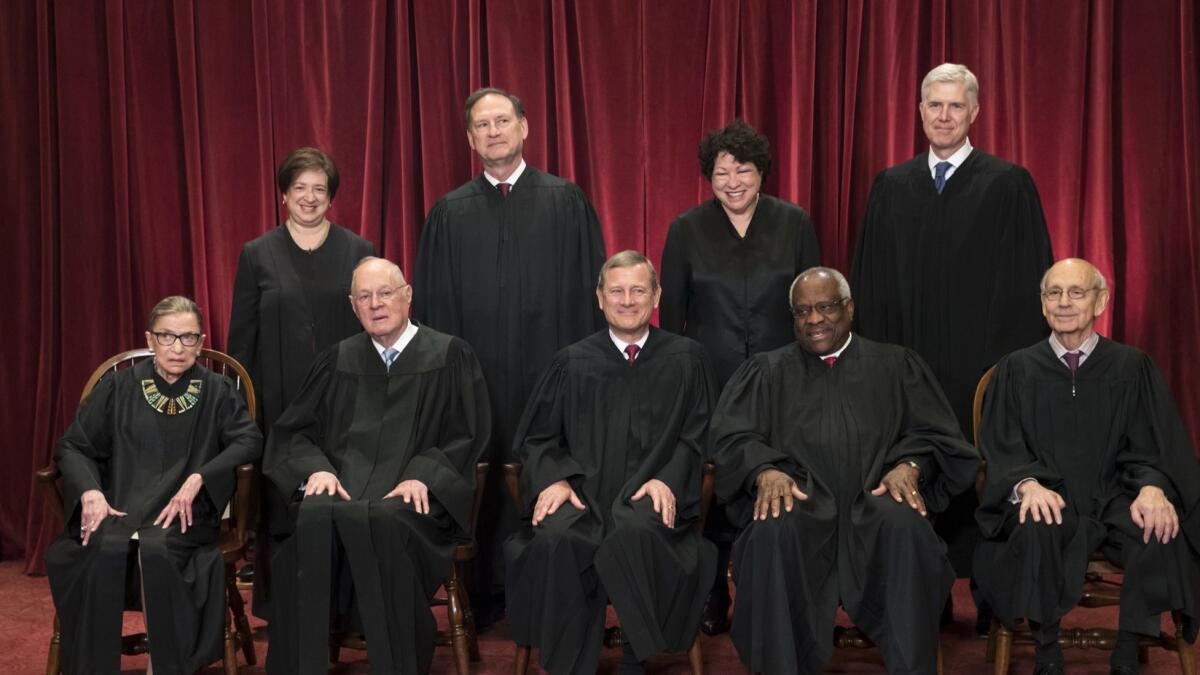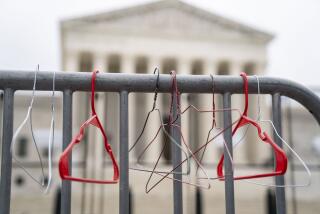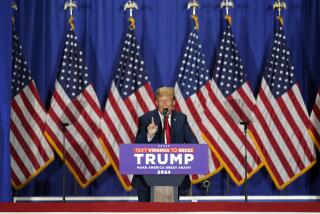Decision time: U.S. Supreme Court’s major rulings in 2018

The Supreme Court wrapped up its term in late June by deciding cases on unions, crisis pregnancy centers and President Trump’s travel ban.
This term’s best-known case was a culture wars clash pitting equal rights for gay customers against a claim of religious liberty from a Christian store owner. It was one of three major cases featuring a “compelled speech” claim from conservatives who object to liberal state laws. The others involve union fees and California’s required disclosures for crisis pregnancy centers.
For the record:
5:55 p.m. May 27, 2018An earlier version of this article said the case involving unions and “fair share fees” was Janus vs. ASCME. It is Janus vs. AFSCME.
The justices announced their final decisions and then adjourned for the summer.
Here are the major decisions:
Unions and public employees: The court by a 5-4 vote ruled that teachers, police officers and other public employees in California, New York and 20 other mostly Democratic states cannot be required by law to pay a “fair share fee” to cover the cost of collective bargaining. The justices overruled a precedent that since 1977 had allowed contracts that required all employees to pay the fair share fee. But in an Illinois case, the majority ruled that forced fees violate the 1st Amendment because they require some employees to support a group whose views they may oppose. (Janus vs. AFSCME)
Trump and the travel ban: The court by a 5-4 vote ruled President Trump has the power, acting on his own, to bar most visitors and immigrants from several Muslim-majority nations. The controversy over Trump’s travel ban erupted during his first week in the White House, and his orders were repeatedly blocked by judges on the West Coast and the East Coast. But the justices in the majority said the president has broad authority to bar foreign visitors or immigrants. (Trump vs. Hawaii)
Online merchants and sales taxes: The court decided internet merchants can be required to collect sales taxes for all the states and thousands of municipalities where their customers live. It was a $10-billion-dollar-a-year issue for states, a potential headache for small-scale merchants and a matter of basic fairness for traditional retail stores, which must collect such taxes. In 1992, in the era of mail-order catalogs, the court ruled it was unconstitutional to impose such a tax-collecting duty on merchants who had no stores or “physical presence” in a state. In South Dakota vs. Wayfair, the justices, by a 5-4 vote, overturned that ruling, saying it was outdated and unfair.
Gay rights and religious liberty: The court ruled for a Christian baker who refused to make a wedding cake for a same-sex couple and decided by a 7-2 vote that he had been a victim of religious bias. But the court’s opinion was narrowly focused on how the state handled the complaint against the baker. And the court voiced strong support for laws that require equal treatment for gays and lesbians. The justices gave little hint as to how they would decide other cases that pit gay rights against religious liberty. (Masterpiece Cakeshop vs. Colorado Civil Rights Commission)
Partisan gerrymandering: The court refused to decide whether partisan gerrymandering is unconstitutional and instead dismissed cases from Wisconsin and Maryland for procedural reasons. In Gill vs. Whitford, the justices said that several Democratic voters did not have standing to challenge a statewide election map in Wisconsin that was drawn by Republicans. The 2011 map all but guaranteed the GOP would control at least 60% of the seats in the state Assembly, even when Democrats won a slim majority of votes statewide. In Benisek vs. Lamone, Republican voters were challenging a successful Democratic plan to dramatically redraw a congressional district so as to oust a veteran Republican. But the court said only that district judges had no need to act quickly in time for the 2018 elections.
Cellphones and privacy: In a 5-4 decision, the court said police generally need a search warrant based on “probable cause” before they obtain data from a cellphone company that would allow them to track a suspect’s movements for days or weeks at a time. Advocates on the right and the left hailed the ruling in Carpenter vs. United States as a victory for privacy in the digital era.
Workers rights and group arbitration: In Epic Systems vs. Lewis, the court ruled that employers can require workers to resolve all complaints through one-on-one arbitration, including allegations that the company was violating federal wage and hour laws. By a 5-4 vote, the justices rejected the argument that the National Labor Relations Act of 1935 gave workers the right to join together to sue in court or bring group claims before an arbiter. The ruling is a victory for employers and the Trump administration, and it will limit the rights of more 60 million private sector workers whose companies rely on private arbitration.
Pregnancy centers and abortion: By a 5-4 vote, the court said California cannot require faith-based crisis pregnancy centers to notify their patients that the state provides free or low cost “prenatal care and abortion for eligible women.” State lawmakers said these posted disclosures were needed because these centers use “deceptive advertising” to confuse or misinform women. But the justices said state-mandated disclosures were compelled speech that violates the 1st Amendment. (National Institute of Family and Life Advocates vs. Becerra)
Sports betting: In Murphy vs. NCAA, the court by a 6-3 vote struck down the federal law that prohibited states from sponsoring or licensing betting on sports. The ruling in favor of New Jersey was based on the principle that the Constitution does not allow Congress to give orders to the states. The justices said Congress was free to make sports betting a federal offense, but there is no sign such legislation is in the works.
Voting rolls and purges: In Husted vs. A. Philip Randolph Institute, the court by a 5-4 vote upheld an Ohio law that removes registered voters from the rolls if they did not vote in a federal election and did not respond to notices or cast a ballot in the next four years. Ohio says it wants to clean up its voting rolls, but civil rights lawyers said the state has wrongly purged thousands of registered voters. The court’s conservative majority said the Ohio law did not violate the National Voter Registration Act because voters were not dropped “solely” because of their failure to cast a ballot.
Deportation and home burglaries: In Sessions vs. Dimaya, the justices, by a 5-4 vote, struck down part of a federal law that called for deporting noncitizens for a “crime of violence,” but failed to describe which crimes qualify. The disputed provision referred to “a substantial risk that physical force” may be used, but the justices said that was too vague. Justice Neil M. Gorsuch cast a key vote for the majority. The California defendant, a longtime legal immigrant, was slated for deportation because he pleaded guilty to the burglary of an unoccupied home.
Jail and deportation: In Jennings vs. Rodriguez, the court ruled that U.S. immigration law permits long-term jailing of legal immigrants who are fighting their deportation. By a 5-3 vote, the justices rejected the U.S. 9th Circuit Court of Appeals’ view that these detainees had a right to a bond hearing after six months. The ruling dealt only with federal law and left open whether the Constitution puts a limit on such a detention. Justice Elena Kagan recused herself from the case.
More stories from David G. Savage »
Twitter: DavidGSavage
UPDATES:
June 29, 1:20 p.m.: This article was updated with the final decisions of the term.
June 21, 11:30 a.m.: This article was updated with the internet sales tax case.
June 5, 7:30 a.m.: This article was updated after the Masterpiece Cakeshop ruling.
This article was originally published at May 27 at 6 a.m.
More to Read
Get the L.A. Times Politics newsletter
Deeply reported insights into legislation, politics and policy from Sacramento, Washington and beyond. In your inbox three times per week.
You may occasionally receive promotional content from the Los Angeles Times.







